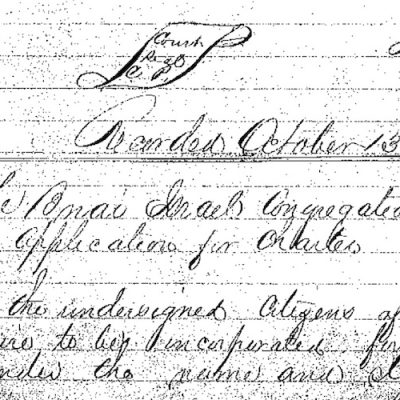
Morris Rosenthal was likely the first Jewish police officer in Pittsburgh, as well as a Jewish communal leader in Pittsburgh in the late 19th century.
Rosenthal (1839/1843-1907) immigrated to the United States from present-day Lithuania around 1857. He initially settled in New York City, where he worked as a peddler. He enlisted as a private with Company C, 31st New York Volunteer Infantry Regiment on May 27, 1861, about six weeks after the start of the Civil War. He was shot in the stomach and the right hand on June 27, 1862 during the Battle of Gaines’s Mill in Hanover County, Va. but served the remainder of his tour of duty, until June 4, 1863.
After being discharged, Rosenthal married Sarah Mollie Meyer. The Rosenthals moved to Wilkes-Barre, Pa. after 1870. By 1873, they had settled in Pittsburgh. They had four children: Myer, Rachel, and Fannie born in New York, and Francis in Pennsylvania.
Soon after arriving in Pittsburgh, Rosenthal joined the Pittsburgh Police Force as a patrolman. His beat was the Strip District, and he often worked the overnight shift. He served on the force through the 1870s. Police officers in that era were mayoral appointments and were sometimes cut during mayoral transitions. Conflicting sources make it hard to verify whether or not Rosenthal was part of the large reduction in the police force prior to 1877. If retained, he would have served during the Railroad Riots of 1877. By 1878, Rosenthal held the rank of lieutenant. He was one of three high-ranking officers who lost appointments after the election of Mayor Robert W. Lyon in 1881.
Even after being discharged, Rosenthal remained active in local politics. The Republican Party tried unsuccessfully to get him to run for select council in 1895, in an attempt to maintain the Jewish vote, but Rosenthal appears to have never run for political office.
Soon after leaving his position on the police force, Rosenthal and fellow officer John Bennett started a saloon in Millvale called “Rosenthal & Bennett.” The saloon sold cigars and liquor and had a pool table for entertainment. The saloon moved to Stowe Township in 1884 and to Wylie Avenue in the Hill District of Pittsburgh in 1885. As a saloon owner, Rosenthal regularly dealt with violent patrons, accusations of violating state Blue Laws, and challenges arising from the licensure program of the Brooks Law.
Rosenthal was a charter member of B’nai Israel Congregation (later Beth Hamedrash Hagodol Congregation) in 1873 and was its most important early president. He led the congregation through the dedication of its first synagogue in 1880 and the construction and dedication of its synagogue on Washington Street in 1892. Following the breakaway of Beth Jacob Congregation in 1883, Rosenthal was accused of secretly supporting the new congregation, prefiguring years of internal dissention within the congregation.
In addition to B’nai Israel, Rosenthal was a committeeman for the Hebrew Sick & Relief Society and a trustee of the Gusky Orphanage. He was also a Mason, an Odd Fellow and a member of the Knights of Pythias and of the Grand Army of the Republic Post No. 3.
Following the death of his wife Sarah Rosenthal died in 1892, Rosenthal married Celia Abelsohn Berenstein of New York City. He remained in business in Pittsburgh for about another decade before moving to upstate New York after 1900, for health reasons.